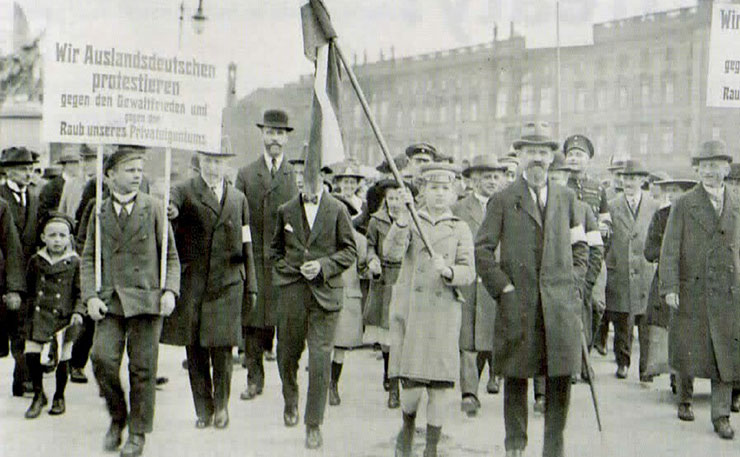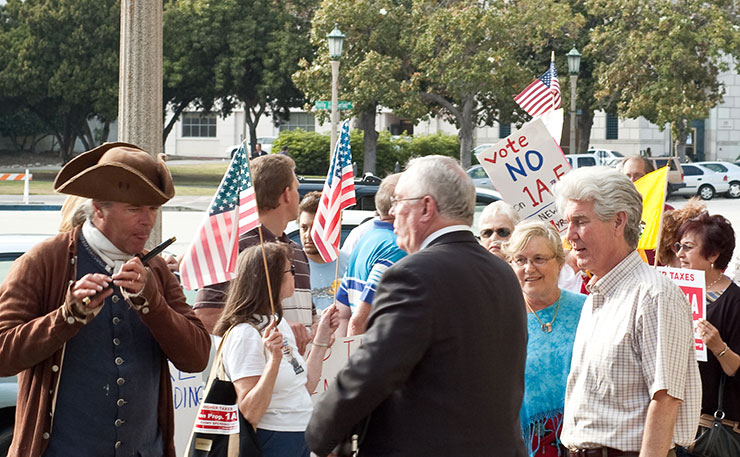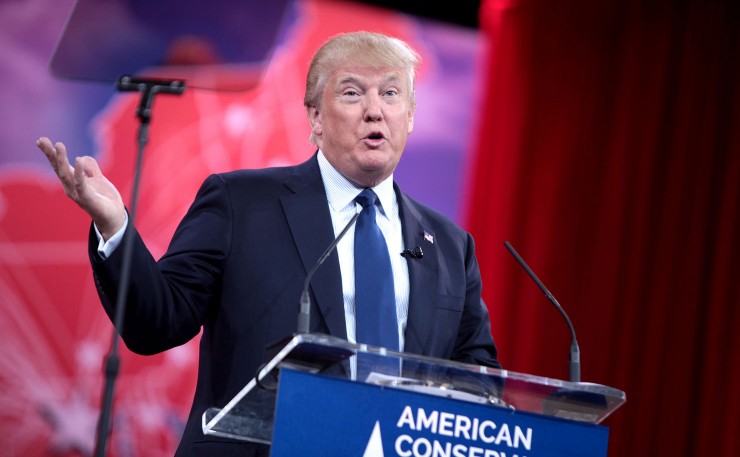OPINION: The United States of today bears a striking resemblance to Germany in the years before the rise of the Nazi Party, writes Associate Professor Noah Riseman.
Growing up Jewish in the United States, I regularly learned about the Holocaust and Nazi Germany. Interpretations of what led to the Holocaust varied, but one constant was the question: Could this happen in America?
History has shown that authoritarian dictatorships and genocide can happen anywhere in the right circumstances. Still, I never really believed that America could turn into a fascist state. Until now.
The more I watch the 2016 election, the more I see parallels to Weimar Germany of the late 1920s and early 1930s. This was a society that was culturally and socially progressive, with Berlin in particular a hotspot for new liberal attitudes towards gender and sexuality.
It was also a period of economic hardship, political gridlock and fragmentation. The economic crisis after the First World War and Treaty of Versailles left many Germans disenchanted with capitalism and the international order.
Throughout Weimar Germany’s entire existence from 1919-33, there were tensions between left and right which erupted in parliamentary debates and in violence on the streets.

The extreme left – in the form of communism and anarchism – became one popular alternative to liberal capitalism. By the late 1920s, the other alternative that promised to make Germany great again was the extreme right fascist movement of the National Socialist Party (Nazis).
By the early 1930s, democracy was clearly broken (if it ever was working in Weimar Germany). Historians and political scientists have written extensively about why the Weimar Republic was so dysfunctional, including a flawed electoral system, the international impositions of the Treaty of Versailles and – what I find most intriguing – the notion that democracy has inbuilt logic designed to destroy itself (read Theorising Democide).
By the early 1930s, there were no working coalitions, political parties would not compromise and the political system reached crisis proportions. In the end it was the Nazis rather than the communists who came to power through the very political system they despised. They only won 33 per cent of the votes in the November 1932 election (incidentally, 2 million fewer voters than they had four months earlier). Whilst not a majority, the Nazis did have a plurality in the German Reichstag.
In January 1933 the president appointed Adolf Hitler as Chancellor of Germany in the hopes that he would stabilise the situation and perhaps even reign in the Nazi Party. A few months later the Reichstag passed the Enabling Law, abolishing democracy and ushering in the Third Reich. I do not need to recap how that worked out.
I look at the United States in 2016 and am struck – indeed frightened – by the parallels to Germany circa 1932. While the causes of the present crisis are different, there are a lot of similar symptoms.
Again, there has just been a major economic recession. Whilst the US economy is improving, people are still angry – and rightfully so – because those who caused the economic crisis have gotten away with it and the political establishment has allowed that to happen.
The political system is not working at all. Congress is so polarised that nothing gets done, compromise has become a dirty word and politicians are willing to let the government shut down just to score points and get their way.
In Weimar Germany one reason for the political fragmentation was because the electoral system allowed parties with minute percentages of the vote to win seats in the Reichstag. In the US, political parties controlling the state legislatures have gerrymandered districts so much that now there are only a handful of marginal districts.
Instead, Republicans are fighting Republicans and Democrats are fighting Democrats to win primaries which may as well be the general elections in most electorates.

A serious consequence of the gerrymander is that Republican candidates for Congress often appeal to the hard-right fringe to win elections. Democrats are just as guilty at gerrymandering, except they have not been nearly as effective in most states, meaning that Republican control of the House of Representatives seems all but assured for the foreseeable future.
Like in Weimar Germany, a significant proportion of the population is looking for alternatives to the political mainstream. Popular movements on the political fringes, left and right, have manifested in the respective forms of presidential candidates Bernie Sanders and Donald Trump (not to mention Ted Cruz and the entire Tea Party).
I openly admit to being a Sanders fan, and many of his cause celebres (i.e. universal healthcare) are common sense in other developed countries. But in the United States, a self-proclaimed socialist who advocates a revolutionary overhaul of American capitalism is someone from the left fringe.
A Bernie Sanders presidency would send shockwaves through the American political system, but it would not mean the end of democracy. Bernie Sanders wants change, but he still believes in the core tenets of the Bill of Rights and the principles of civil rights.
In fact, he would expand the notion of rights to include economic rights. Notwithstanding a groundswell of support especially from young voters, a Sanders nomination for the Democratic Party seems unlikely given the delegate maths.
A Trump candidacy and presidency, however, is becoming ever more plausible, and this truly frightens me. Trump is the culmination of over 30 years of Republicans convincing many Americans that government is the enemy, or what conservative New York Times columnist David Brooks calls 30 years of antipolitics.
As former liberal Congressman Barney Frank argues, in power Republicans have dismantled government programs and regulations in a self-fulfilling prophecy that reinforces the perception of government’s ineffectiveness. Now, to the horror of the Republican establishment, Donald Trump has seized their message and is channelling it with gusto, but with his own warped, authoritarian tinge.

Donald Trump openly talks about implementing torture, undermining freedom of speech and the press and behaving belligerently with other nation-states. What worries me the most is that he scapegoats and demonises Muslims and Latino immigrants with alarming comparisons to Hitler’s rhetoric about Jews.
Trump’s populist-nationalism may not mesh with traditional Republican conservatism, but it ticks many of the boxes for fascism.
Until last week I really believed that Trump would never be president. Now I do not know anymore, and it terrifies me. If we look at the outcomes of the Republican primaries, caucuses and polls, it is clear that Trump has a hard-core base of between 30 to 40 per cent of Republican voters.
That is not a majority of Republican voters or even a majority of Americans. But in a broken, fragmented system, that may be enough support to be elected president.
Would a Trump presidency turn America into a fascist state? I like to think that the constitutional system has enough checks and balances not to let that happen. I like to think that Congress would never pass enabling legislation to force Muslims to wear badges or to force the deportation of millions of Latino families. I like to think that the Supreme Court would exercise judicial review and that the executive branch would respect any rulings from the court.
But I just do not know any more. And even if Trump does not become president, I still cannot help but think that Weimar America will never be the same again.
Donate To New Matilda
New Matilda is a small, independent media outlet. We survive through reader contributions, and never losing a lawsuit. If you got something from this article, giving something back helps us to continue speaking truth to power. Every little bit counts.




